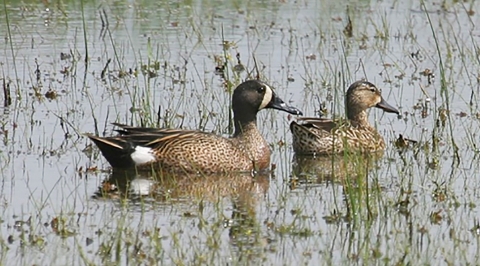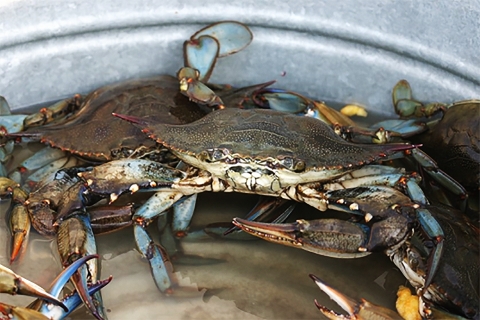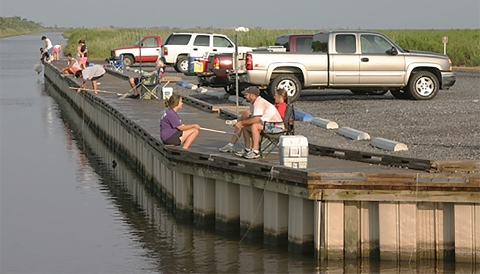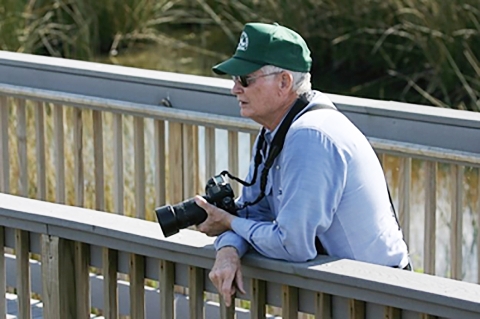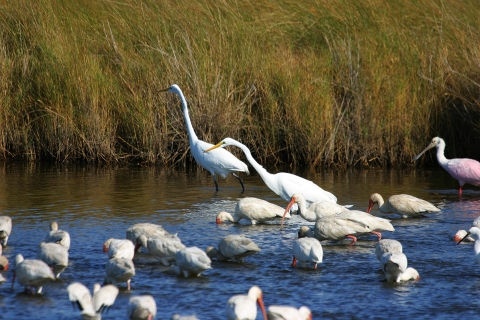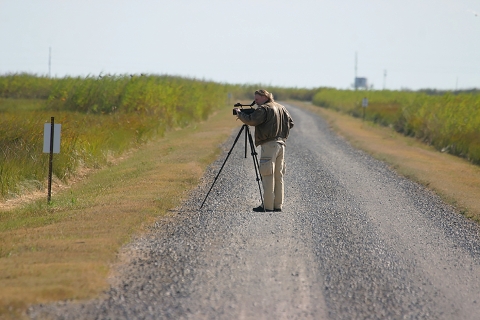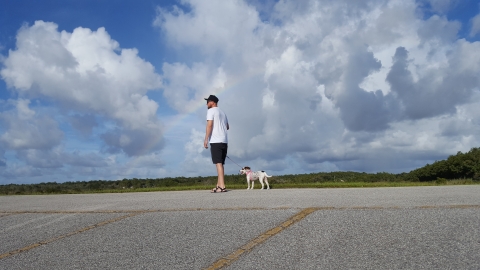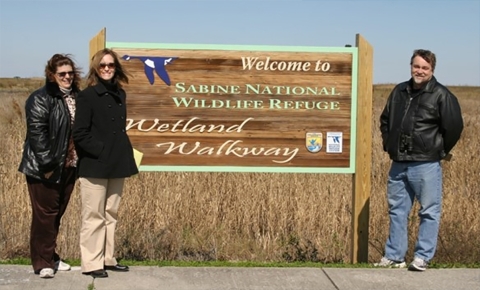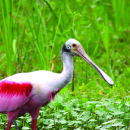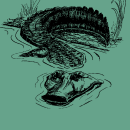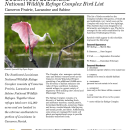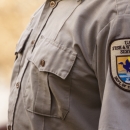Visit Us
Located approximately 26 miles south of Sulphur, Louisiana, Sabine National Wildlife Refuge has numerous recreation areas where you can fish, crab or take a hike. Whether you are looking for an alligator to photograph or just a place to stretch your legs, the Wetland Walkway is always an adventure.
Activities
Hunting, Fishing, Hiking and Wildlife Observation and Photography are all popular activities on Sabine NWR.
Hunting is an important wildlife management tool that we recognize as a healthy, traditional outdoor pastime, deeply rooted in America’s heritage. Hunting can instill a unique understanding and appreciation of wildlife, their behavior, and their habitat needs. As practiced on refuges, hunting, and fishing do not pose a threat to wildlife populations, and in some instances are necessary for sound wildlife management. Hunting programs can promote understanding and appreciation of natural resources and their management on lands and waters in the refuge system.
Learn more about our hunting regulations here: Southwest Louisiana Hunting Regulations
Learn more about our fishing and boating regulations here: Louisiana Fishing and Boating RegulationsSouthwest
HUNTING
Alligator
The alligator season generally occurs in September, after hatching season, but prior to winter hibernation. The season is set by LDWF and may vary slightly depending on the duration of the nesting season. The refuge harvest follows state regulations, but may be more restrictive under certain conditions. A limited number of alligator hunters are selected through a lottery drawing every three years.
Waterfowl
Hunting of ducks, geese, gallinules and coots is permitted in designated areas of the refuge during the waterfowl seasons set by the Louisiana Department of Wildlife and Fisheries. All hunters are required to have a refuge-issued permit.
Waterfowl hunt scouting, waterfowl general hunt. Each hunting party is required to complete a harvest report listing numbers and species of game taken. Forms may be placed in designated check station drop boxes after each hunt or delivered to the refuge complex office at Cameron Prairie NWR.
Waterfowl hunt scouting is permitted during the entire fishing season (Mar 15-Oct 15) & Mon-Fri during the week prior to Louisiana’s coastal zone duck and coot season starts. Waterfowl general hunting is available Wednesday, Thursday, Saturday and Sunday during the Louisiana coastal zone duck and coot season, and September teal season. Designated areas only. Closed Fridays.
CFR Entries: Title 50 Volume 6 Chapter 1 Parts 18-199 Code of Federal Regulations. All hunting is in accordance with applicable state licensing and regulations, unless otherwise stated in refuge specific regulations.
FISHING
All recreational anglers must possess a valid, basic Louisiana fishing license. Additionally, all recreational anglers fishing south of the state designated 'saltwater line' for saltwater species must have in their possession a Louisiana saltwater angler's license, as well as their basic Louisiana fishing license.
Fishing is permitted with rod and reel or pole and line, as well as jug fishing in designated areas on Sabine National Wildlife Refuge.
Anglers seeking freshwater fishing opportunities should try the interior waters of Sabine National Wildlife Refuge. Those anglers seeking saltwater fish should utilize Sabine's roadside recreation area wharfs and tidal marshes.
Crabbing
Each person is required to have either the Hook and Line license or the basic and saltwater licenses. Recreational crabbing is only permitted with a crab/drop net and/or hand line. Only cotton line and drop nets up to 24” outside diameter may be used. Floats on crab lines are prohibited. All hand lines, drop nets, and bait must be removed from the refuge upon leaving. The daily crab limit is five dozen (60) per day per vehicle or boat. See refuge specific regulations for crabbing opportunities.
Cast Netting
Each person is required to have a valid, basic fishing license as well as a saltwater license to cast net for shrimp. (Sabine is south of the state designated saltwater line.) Cast nets must be less than 8.5 feet in radius. Recreational cast netting for shrimp is only permitted via boat during Louisiana inshore water shrimp season.
Possession Limits
Daily fish limits are the same as Louisiana's sport fishing limits. The daily crab limit is five dozen per day per vehicle or boat. The daily shrimp limit during the Louisiana inshore shrimp season is five gallons of heads-on shrimp per day, per vehicle or boat. The daily bait shrimp limit is one gallon per day per boat.
Universal Access
Several universally accessible fishing docks are available at Sabine NWR. For further assistance contact our Refuge Complex office at 337-598-2216.
Fishing, Crabbing, Cast netting, Shrimping
- Recreational fishing with rod and reel, pole and line, and/or jug lines is permitted. Jug line fishing is permitted in designated waterways open to fishing. It is prohibited inside Units 1A, 1B and 3. Jugs are limited to 10 per boat and must be attended at all times. All jugs must be marked with the attendants fishing license number and must be removed from the refuge daily. The use or possession of any other type of fishing gear including, limb and trot lines, and gill, trammel, and hoop nets, are prohibited in all refuge waters. The daily fish limits are the same as Louisiana’s sport fishing limits.
- Northline Recreational Area: Fishing and crabbing, year-round, sunrise to sunset.
Hog Island Cully: Fishing and crabbing, year-round, sunrise to sunset.
Blue Crab: Fishing and crabbing, year-round, sunrise to sunset.
West Cove: Fishing and crabbing, year-round, sunrise to sunset.
Interior bayous, canals and ponds: Fishing and crabbing, March 15 through October 15, sunrise to sunset. Cast netting for shrimp from a boat, Louisiana inshore shrimp season, sunrise to sunset. Cast netting for bait from a boat. Louisiana’s inshore shrimp season is one gallon, from March 15 through October 15, sunrise to sunset. - Title 50 Volume 6 Chapter 1 Parts 18-199 Code of Federal Regulations. All fishing, crabbing, and cast-netting on refuges are in accordance with applicable state licenses. Individuals utilizing the refuges are subject to inspections of licenses, fishing equipment, daily limits, boats, vehicles and their contents by federal and state officers. For recreational crabbing, each person is required to have either the Hook and Line license or the basic and saltwater licenses. Recreational crabbing is only permitted with a crab/drop net and/or hand line. See refuge specific regulations for crabbing opportunities. Each person is required to have basic and saltwater licenses to cast net for shrimp. Cast nets must be less than 8.5 feet in radius. Recreational cast netting for shrimp is only permitted during the Louisiana inshore water shrimp season. See refuge specific regulations for additional information. Daily fish limits are the same as Louisiana’s sport fishing limits. The daily crab limit is five dozen per day per vehicle or boat. The daily shrimp limit during the Louisiana inshore shrimp season is five gallons of heads-on shrimp per day, per vehicle or boat. The daily bait shrimp limit is one gallon per day per boat.
WILDLIFE VIEWING AND PHOTOGRAPHY
Scenic Overlooks
In cooperation with the Creole Nature Trail All American Road, the refuge maintains a roadside 'Scenic Overlook' along State Highway 27. This area allows visitors on the refuge to stop and observe coastal marsh habitat and the wildlife inhabiting it without having to leave their vehicle.
Trails
There are two wildlife observation trails on the refuge, one in a freshwater impoundment and another in coastal brackish/saline marsh.
The Wetland Walkway is a one-and-a-half mile trail and boardwalk located approximately four miles south of the refuge office with parking and facilities near State Highway 27. It provides opportunities for wildlife observation and photography. There is a boardwalk over the impounded freshwater marsh of Unit 1B and wildlife can frequently be seen crossing the trail. The trail also features a raised observation tower that affords spectacular views especially at sundown when the western sky frames acres of grassy marsh. Visitors can see wading birds, waterfowl, alligator, rabbits, armadillos, muskrat, nutria, nesting birds, butterflies, and migrant songbirds during various times of the year from the trail. The trail is open year-round from dawn until dusk.
The Blue Goose Trail is located along State Highway 27 just north of the refuge office and features parking and a wildlife observation platform. Wading birds, shorebirds, waterfowl, diamond backed terrapins, and many other brackish/saline marsh and shoreline species may be seen along the trail. The trail is open year-round from dawn until dusk.
Sabine NWR also offers hikers two pedestrian hiking trails.
The Blue Goose Trail and the Wetland Walkway offer a variety of wildlife viewing and photography opportunities to refuge visitors.
Photography
Wildlife photography is permitted at designated roadside and recreation areas and in the interior refuge canals and marshes.
Wildlife photography is permitted year round at designated roadside and recreation areas. Interior refuge canals and marshes are open to photography from March 15 to October 15.
Birding
Southwest Louisiana Complex Birds List
- Several species of native and migratory birds may be photographed. There is no special permit required to observe or photograph birds on the refuge.
- Birding is permitted year round, from dawn until dusk.
Dog walking
All pets must be on a leash at all times when on the refuge.
Pets are allowed on the Blue Goose Trail and Wetland Walkway, as well as roadside recreation areas, year round, dawn until dusk.
Driving Directions to all major entrances:
From Points West: I-10 Eastbound, Exit 20 -- LA1256 Sulphur, Cameron. Head south for approximately 26 miles. Observe Sabine NWR signs.
From Points East: I-10 Westbound, Exit 20 – LA1256 Sulphur, Cameron. Head south for approximately 26 miles. Observe Sabine NWR signs.
Trails
There are two wildlife observation trails on the refuge, one in a freshwater impoundment and another in coastal brackish/saline marsh.
The Wetland Walkway is a one-and-a-half mile trail and boardwalk located approximately four miles south of the refuge office with parking and facilities near State Highway 27. It provides opportunities for wildlife observation and photography. There is a boardwalk over the impounded freshwater marsh of Unit 1B and wildlife can frequently be seen crossing the trail. The trail also features a raised observation tower that affords spectacular views especially at sundown when the western sky frames acres of grassy marsh. Visitors can see wading birds, waterfowl, alligator, rabbits, armadillos, muskrat, nutria, nesting birds, butterflies, and migrant songbirds during various times of the year. The trail is open year-round from dawn until dusk.
The Blue Goose Trail is located along State Highway 27 just north of the refuge office and features parking and a wildlife observation platform. Wading birds, shorebirds, waterfowl, diamond backed terrapins, and many other brackish/saline marsh and shoreline species may be seen along the trail. The trail is open year-round from dawn until dusk.
Related Documents
Please view the Brochures which includes Maps and great information about the refuge.
Other Facilities in the Complex
The Southwest Louisiana National Wildlife Refuge Complex consists of four federal wildlife refuges located in southwest Louisiana: Cameron Prairie, Sabine, Lacassine, and Shell Keys. Each of these national wildlife refuges was created to support, protect, and provide winter habitat for migratory waterfowl. These refuges are part of the National Wildlife Refuge System, which is a national network of lands consisting of more than 560 refuges and thousands of waterfowl production areas throughout all 50 states and U.S. territories, all of which are administered by the U.S. Fish and Wildlife Service.
The more than 184,000 acres of land contained within boundaries of the four National Wildlife Refuges in southwest Louisiana supports numerous species of both plants and wildlife. The Southwest Louisiana National Wildlife Refuge Complex offers a multitude of opportunities for you and your family to learn more about and enjoy these national wildlife refuges.
For additional information about Cameron Prairie, Lacassine, Sabine and Shell Keys National Wildlife Refuges contact us at:
Southwest Louisiana National Wildlife Refuge Complex
1428 Highway 27
Bell City LA 70630
337-598-2216
Email: SWLRComplex@fws.gov
Locations
Email contact: swlrcomplex@fws.gov


